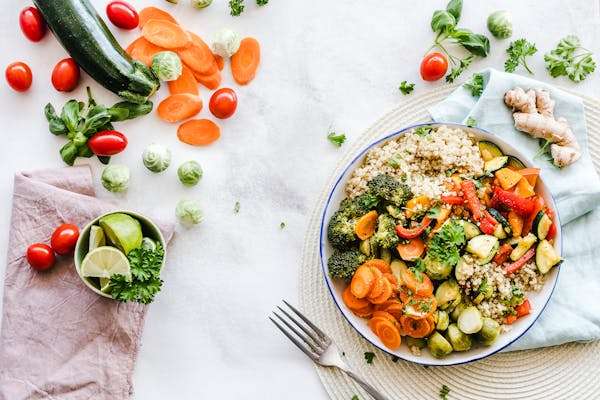To guarantee that the mother and unborn child receive the nutrients they require for optimum health, it is imperative to maintain a nutritious diet during pregnancy.
In order to support the body’s increased nutritional needs, boost energy levels, and lower the risk of difficulties, a balanced diet for pregnant women is essential.
This thorough guide will go over the top five advantages of eating a balanced diet while pregnant and offer helpful advice on how to accomplish it.
Expectant mothers can help ensure a healthier pregnancy and a more easy transition to motherhood by being aware of these advantages and implementing them into everyday routines.

Improved Nutrient Intake:
The increased nutritional intake that comes with eating a balanced diet is one of the biggest benefits for expectant mothers. A woman’s body needs more nutrients during pregnancy to support the growth of her unborn child as well as her health.
These requirements are satisfied by a balanced diet, which consists of a range of foods that provide important vitamins, minerals, proteins, and healthy fats.
Essential Nutrients and Their Roles:
Pregnant women should have a balanced diet that includes a variety of nutrients that are essential for both the health of the mother and the fetus. Folic acid, for example, promotes the development of the baby’s brain and spinal cord and helps avoid neural tube defects.
Calcium and vitamin D help to build the baby’s strong bones and teeth, while iron is essential for boosting blood volume and preventing anemia. For the mother and the unborn child’s tissues and organs to grow, protein is necessary.

These nutrients are continuously supplied when a range of fruits, vegetables, lean meats, whole grains, and dairy products are included.
Pregnant women can get optimal amounts of these vital nutrients and improve the health of both themselves and their unborn child by eating a balanced diet.
Better Weight Management:

Better weight management is a crucial benefit of maintaining a balanced diet for pregnant women. Proper weight gain is essential during pregnancy, as it supports the baby’s development and prepares the mother’s body for childbirth. However, excessive weight gain can lead to complications such as gestational diabetes, hypertension, and an increased risk of cesarean delivery.
How a Balanced Diet Aids in Weight Management:
Pregnant women who follow a balanced diet that provides the correct balance of nutrients without going overboard can better control their weight.
A balanced diet consists of a range of fruits, vegetables, lean proteins, and whole grains, with an emphasis on ingesting nutrient-dense meals rather than high-calorie, low-nutrient ones. This strategy lessens the desire to overeat, encourages satiety, and helps control hunger.
A balanced diet also encourages a consistent pattern of weight gain that is in line with medical recommendations. For example, high-fiber foods, like veggies and whole grains, facilitate digestion and help avoid constipation, which is a typical pregnancy side effect.
Foods high in protein help to build and repair muscle, which is essential for good health and weight management.
By following a balanced diet, pregnant women can achieve a healthy weight gain trajectory, contributing to a safer and more comfortable pregnancy.
Enhanced Energy Levels:
Enhanced energy levels are a notable benefit of maintaining a balanced diet for pregnant women. Pregnancy can be physically demanding, often leading to fatigue and decreased energy as the body adjusts to support a growing baby.
A well-rounded diet helps to counteract these effects by providing sustained energy throughout the day.
How a Balanced Diet Boosts Energy:
A balanced diet for pregnant women plays a critical role in boosting energy levels through its composition of different foods high in nutrients. The main source of energy is carbohydrates, which can be found in whole grains, fruits, and vegetables.
They prevent the energy crashes brought on by refined sweets by releasing glucose into the bloodstream gradually. Lean meats, beans, and nuts are rich sources of proteins that support muscle function and repair, which is particularly crucial during pregnancy and contributes to sustained energy.
Nuts, avocados, and olive oil are good sources of healthy fats that support stable blood sugar levels and are essential for energy.
Moreover, the creation of energy is supported generally by a balanced diet rich in vitamins and minerals, such as iron and B vitamins. For instance, iron aids in the synthesis of hemoglobin, which distributes oxygen throughout the body and lessens fatigue.
By following a balanced diet, pregnant women can experience improved energy levels, better manage daily activities, and feel more vibrant throughout their pregnancy.
Reduced Risk of Complications:
Reduced risk of complications is a significant benefit of adhering to a balanced diet for pregnant women. A well-balanced diet supports overall health and helps mitigate the risk of various pregnancy-related complications, which can affect both the mother and the baby.
How a Balanced Diet Minimizes Risks:
A balanced diet for pregnant women provides essential nutrients that help prevent several common pregnancy complications. For instance, adequate intake of calcium and vitamin D helps reduce the risk of developing preeclampsia, a condition characterized by high blood pressure and potential damage to organs.
Iron, found in foods like lean meats and leafy greens, helps prevent anemia, which can lead to fatigue and complications during delivery. Consuming meals high in fiber, such as veggies and whole grains, also aids in the prevention of constipation, a common condition that can worsen discomfort and lead to difficulties.
In addition to strengthening the immune system, a healthy diet lowers the risk of infection and generally promotes a better pregnancy. Pregnant women can lower their risk of gestational diabetes by managing their weight and blood sugar levels more effectively by consuming nutrient-dense diets and limiting their intake of processed and sugary foods.
Optimal Fetal Development:
Optimal fetal development is a crucial benefit of following a balanced diet for pregnant women. Proper nutrition during pregnancy is essential for the healthy growth and development of the baby, as the nutrients consumed directly impact the baby’s physical and cognitive development.
How a Balanced Diet Supports Fetal Development:
A balanced diet for pregnant women provides the essential nutrients required for the baby’s development. For instance, folic acid, which is found in leafy greens, citrus fruits, and fortified cereals, plays a key role in preventing neural tube defects and supports the development of the brain and spinal cord.
Iron, obtained from lean meats and legumes, supports the formation of hemoglobin and ensures adequate oxygen supply to the baby. Dairy products and foods fortified with calcium and vitamin D are essential for the growth of an infant’s bones and teeth.
Flaxseeds and fatty fish are good sources of omega-3 fatty acids, which support brain development and enhance cognitive performance. Protein promotes the general growth of the baby’s muscles and organs since it is essential for tissue repair and cell proliferation.
Pregnant women can give their unborn child the greatest start in life by including a range of nutrient-rich foods in their diet. This will promote healthy growth and lower the likelihood of developmental problems.
To put it simply, a balanced diet guarantees that the mother and child get all the nutrients they require for a healthy pregnancy and optimal development of the fetus.
How to Achieve a Balanced Diet for Pregnant Women:
Achieving a balanced diet for pregnant women involves making thoughtful food choices and planning meals to meet both the mother’s and baby’s nutritional needs. Proper dietary practices ensure that the pregnancy progresses smoothly and supports overall health.
Practical Tips for a Balanced Diet:
- Incorporate a Variety of Foods: To ensure a well-rounded intake of nutrients, include a wide range of food groups in your diet. This means eating fruits, vegetables, whole grains, lean proteins, and dairy products. Each food group provides different essential nutrients necessary for both maternal health and fetal development.
- Focus on Nutrient-Dense Foods: Opt for foods rich in vitamins and minerals rather than empty-calorie options. For instance, choose whole grains like brown rice and quinoa over refined grains, and include a variety of colorful vegetables and fruits to maximize vitamin and mineral intake.
- Stay Hydrated: Drinking plenty of water is crucial during pregnancy. Adequate hydration supports overall health, aids digestion and helps maintain amniotic fluid levels.
- Monitor Portion Sizes: Eating balanced meals with appropriate portion sizes helps manage weight and ensures you’re getting the right amount of nutrients without excess calories.
- Include Key Nutrients: Pay special attention to nutrients critical during pregnancy, such as folic acid, iron, calcium, and omega-3 fatty acids. Incorporate foods like leafy greens, lean meats, dairy products, and fatty fish to meet these needs.
By following these guidelines, pregnant women can achieve a balanced diet that supports their health and promotes optimal fetal development. Regularly consulting with a healthcare provider or a registered dietitian can also provide personalized advice and help maintain dietary balance throughout pregnancy.
Conclusion:
Pregnant women should incorporate a balanced diet to ensure optimal fetal growth and mother health. Expectant moms can better control their weight, increase their energy levels, and lower their risk of difficulties by eating a wide range of nutrient-dense foods, drinking plenty of water, and paying attention to portion sizes.
Making these eating habits a priority facilitates a healthy pregnancy, enhances the well-being of the mother and child, and clears the path for a more seamless transition into motherhood. Click to learn more.
FAQs:
What is a balanced diet for pregnant women?
A balanced diet for pregnant women includes a variety of nutrient-rich foods such as fruits, vegetables, whole grains, lean proteins, and dairy products to support both maternal and fetal health.
Why is folic acid important during pregnancy?
Folic acid helps prevent neural tube defects in the baby and supports the development of the brain and spinal cord.
How can a balanced diet help manage pregnancy weight?
A balanced diet helps regulate weight by providing essential nutrients while avoiding excess calories, promoting healthy and steady weight gain.
What are the benefits of including omega-3 fatty acids in a pregnancy diet?
Omega-3 fatty acids support brain development and cognitive function in the baby and can also help reduce the risk of preterm birth.
How much water should pregnant women drink daily?
Pregnant women should aim to drink about 8-10 cups of water daily to stay hydrated, support digestion, and maintain amniotic fluid levels.
